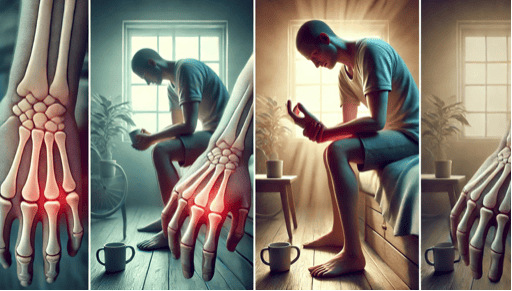Managing Pain in 7 easy steps.
Introduction
Living with Rheumatoid Arthritis (RA) can feel overwhelming, with the constant cycle of pain, stiffness, and fatigue taking its toll on both physical and emotional well-being. This chronic autoimmune condition doesn’t just affect the joints; it can impact every aspect of a person’s life.
As a hypnotherapist, I’ve had the privilege of working with clients seeking relief from the symptoms of Rheumatoid Arthritis. While conventional treatments like medications and physiotherapy are vital, many individuals still struggle to manage the emotional stress and persistent discomfort that accompany this condition.
Through hypnotherapy, I’ve seen incredible transformations—clients reducing their pain, minimising stress, and reclaiming control over their lives. In this article, I’ll explain what RA is, explore its causes and symptoms, and share how hypnotherapy can serve as a powerful complementary tool to traditional treatments.
1. What is Rheumatoid Arthritis?
Rheumatoid Arthritis (RA) is a chronic autoimmune condition that affects millions worldwide, targeting the joints and sometimes other parts of the body. Unlike osteoarthritis, which results from wear and tear, RA stems from an overactive immune system mistakenly attacking healthy tissues. This inflammatory process primarily affects the synovium, the thin lining of joints, causing pain, swelling, and stiffness.
One of the hallmarks of Rheumatoid Arthritis symptoms is its symmetrical nature. For instance, if one wrist or hand is inflamed, the other is likely to be affected too. This unique characteristic sets RA apart from other forms of arthritis. Clients often describe experiencing morning stiffness that lasts for more than an hour, alongside fatigue and a general feeling of being unwell. Over time, unchecked inflammation can lead to joint deformities and reduced mobility.
A Visualisation of Living with RA
Imagine waking up in the morning and feeling as if your joints have been wrapped tightly in heavy chains overnight. Your fingers struggle to bend, and your knees feel swollen and hot, as though they’ve been filled with thick, unyielding cement. Even the simple act of lifting a coffee cup or buttoning a shirt seems overwhelming.
Now picture this weight compounded by an emotional fog—frustration with your body’s betrayal and anxiety about when the next flare-up will strike. This is the daily reality for many living with Rheumatoid Arthritis, a condition that doesn’t just affect the body but challenges the mind as well.
The Emotional Impact of RA
RA isn’t just a physical condition; its emotional toll is profound. Many of my clients feel frustrated, isolated, or even defeated as they grapple with the unpredictable nature of flare-ups. This emotional distress can exacerbate symptoms, creating a challenging cycle of pain and stress.
The good news is that understanding this mind-body connection opens the door to effective complementary therapies like hypnotherapy. By addressing both the physical and emotional dimensions of RA, individuals can break free from this cycle and regain a sense of control over their condition.
2. Symptoms and Causes of Rheumatoid Arthritis
Symptoms of RA
The symptoms of Rheumatoid Arthritis can vary significantly, but certain signs are almost universal among those affected:
- Joint pain that often begins in the hands, wrists, or feet.
- Swelling and warmth around the joints.
- Morning stiffness that can last for an hour or more.
- Fatigue and a persistent feeling of being unwell.
Over time, untreated RA can lead to joint deformities, reduced mobility, and challenges in performing everyday activities. For many, the symptoms fluctuate, with periods of relative calm followed by intense flare-ups.

A Day in the Life of Someone with RA
Picture this: It’s early morning, and you awaken with a dull ache in your hands. As you try to move, the ache sharpens, spreading through your wrists and up your arms like a burning tide. Every movement feels heavy and deliberate, as if your joints have become rusted hinges.
Later, as the day progresses, fatigue seeps into every fibre of your being, making even small tasks feel like climbing a mountain. By evening, the inflammation builds—your joints feel swollen and tight, and sitting for too long only makes the stiffness worse.
For those living with Rheumatoid Arthritis, this cycle is relentless. But understanding its symptoms is the first step towards breaking free from its hold.
What Causes Rheumatoid Arthritis?
The exact cause of Rheumatoid Arthritis remains unknown, but research has uncovered several factors that contribute to its onset:
- Genetics: Individuals with a family history of RA are at higher risk.
- Environmental Triggers: Certain infections, smoking, or exposure to pollutants may activate the immune system in susceptible individuals.
- Hormonal Factors: RA is significantly more common in women, particularly during hormonal shifts like menopause.
- Stress: Emotional or physical stress can act as a trigger for flare-ups in those predisposed to the condition.
Connecting Stress and Symptoms
One of the less-discussed aspects of RA is the profound connection between stress and symptom severity. Stress triggers the release of cortisol and other hormones that can amplify inflammation and make Rheumatoid Arthritis symptoms worse.
As a hypnotherapist, I often help clients identify these stress triggers and develop tools to calm their body’s fight-or-flight response. By addressing the stress element, many clients experience fewer flare-ups and improved overall well-being.

3. The Science of Hypnosis in Managing Rheumatoid Arthritis Pain
Research increasingly highlights hypnosis and related mind-body therapies as valuable complementary approaches for managing pain, including in chronic conditions such as rheumatoid arthritis (RA). These approaches leverage the brain’s ability to influence pain perception, promoting symptom relief and improving overall quality of life.
Supporting Research on Hypnotherapy and Pain Management
Hypnotherapy has shown promising results in reducing chronic pain, with several studies illustrating its effectiveness in conditions like arthritis. A study published in the Journal of Rheumatology found that patients undergoing hypnotherapy experienced significant reductions in joint pain and stiffness. The study attributed these improvements to hypnosis’s ability to alter the brain’s response to pain signals, enhancing relaxation and reducing inflammation-related stress.
The National Institutes of Health (NIH) highlights the role of therapies such as pain reprocessing therapy (PRT) and mind-body interventions in chronic pain management. While PRT focuses on retraining the brain to perceive pain as less threatening, similar principles apply to hypnotherapy, where guided relaxation and suggestion help reshape how patients experience and cope with pain. These approaches have shown to maintain benefits even a year post-treatment in many cases.
Additionally, a meta-analysis by the National Center for Complementary and Integrative Health (NCCIH) reports that mind-body practices, including hypnosis, can complement conventional RA treatments. Though these interventions may not directly alter disease progression, they offer significant relief from associated symptoms like pain, fatigue, and stress, thereby enhancing patients’ quality of life.
The Mechanisms Behind Hypnotherapy’s Success
Hypnotherapy works by promoting deep relaxation and focusing the mind on positive, health-oriented suggestions. This process can help:
- Reduce Pain Sensitivity: Hypnosis appears to reduce activity in the areas of the brain associated with pain perception, allowing patients to experience a more manageable level of discomfort.
- Enhance Emotional Resilience: Many RA patients report improvements in mood and reductions in anxiety and depression symptoms, which often exacerbate pain.
- Improve Sleep: The deep relaxation induced during hypnotherapy sessions has been linked to better sleep quality, addressing a common challenge among individuals with chronic pain.
By integrating hypnotherapy into a broader treatment plan, patients often report experiencing enhanced well-being and a stronger sense of control over their condition.
Why This Matters for Rheumatoid Arthritis
Traditional RA treatments focus on managing inflammation and joint damage, but the mental and emotional dimensions of pain can remain challenging. Hypnotherapy directly addresses these dimensions, making it a powerful tool for those seeking a holistic approach to health. With the growing body of evidence supporting its efficacy, hypnotherapy is increasingly recognised as a complementary option alongside medications, physiotherapy, and other interventions.
Practical Implementation for RA Patients
For individuals considering hypnotherapy, sessions are tailored to target specific symptoms or challenges, such as flare-up pain or stress management. In the hands of a trained hypnotherapist, this personalised approach can yield tangible benefits, helping patients regain confidence in their body’s ability to heal and thrive.
By grounding this therapy in both scientific evidence and practical application, hypnotherapists offer a compassionate, effective way to navigate the complexities of rheumatoid arthritis. This collaborative, patient-centred approach ensures that each individual’s journey to improved health is as empowering as it is transformative.
4. A Holistic Approach to Managing Rheumatoid Arthritis
While hypnotherapy is powerful, it works best as part of a holistic approach to managing Rheumatoid Arthritis. Here are other strategies I recommend:
a. Diet
An anti-inflammatory diet can help reduce RA symptoms. Foods rich in omega-3 fatty acids, like salmon and walnuts, along with leafy greens and turmeric, are particularly beneficial. On the other hand, processed foods, sugar, and refined carbohydrates should be avoided, as they can increase inflammation.
b. Exercise
Gentle exercises like yoga, swimming, or tai chi improve joint mobility and reduce stiffness. Through hypnotherapy, I help clients overcome the fear of movement and reintroduce physical activity into their routines.
c. Stress Management
Mindfulness and meditation are excellent complements to hypnotherapy. Regular practice can help maintain a calm mind and reduce the frequency of stress-induced flare-ups.
This comprehensive approach addresses not just the physical aspects of RA but also the mental and emotional challenges, creating a pathway to better health.
5. Real Success: A Client’s Story
One of the most rewarding aspects of my work is witnessing the transformation of clients living with Rheumatoid Arthritis.
Sarah, a 45-year-old nurse, came to me feeling defeated by her condition. The constant joint pain, fatigue, and frequent flare-ups made it hard for her to enjoy life or do her job. She was sceptical about hypnotherapy at first but decided to give it a try after hearing how it could help with pain and stress.
In our sessions, we focused on reducing her pain perception through guided imagery. I helped her visualise her joints being free of inflammation and taught her techniques to relax deeply during moments of stress.
Over time, Sarah began to notice significant improvements. Her pain became more manageable, she had fewer flare-ups, and she regained the confidence to move her body again. Today, she describes herself as “in control” of her RA—a powerful testament to the benefits of hypnotherapy.

6. Is Hypnotherapy Right for You?
Hypnotherapy is a safe and effective complementary treatment for Rheumatoid Arthritis, particularly for those who:
- Struggle with persistent pain despite conventional treatments.
- Experience stress or anxiety related to their condition.
- Want a natural way to manage their symptoms alongside medical care.
While hypnotherapy isn’t a substitute for medication or physiotherapy, it offers a holistic way to address the mind-body connection and enhance overall well-being.

Conclusion
Living with Rheumatoid Arthritis can be challenging, but it doesn’t have to define your life. By addressing both the physical and emotional dimensions of the condition, you can create a more balanced, fulfilling life.
Hypnotherapy, combined with a holistic approach involving a healthy diet, gentle exercise, and stress management, empowers individuals to take control of their symptoms. Whether you’re newly diagnosed or have been managing RA for years, there is always room for hope and healing.
Take the first step today—you deserve to feel empowered, resilient, and at peace.




